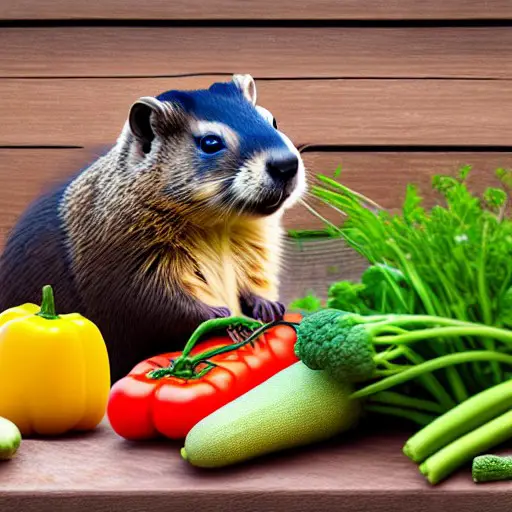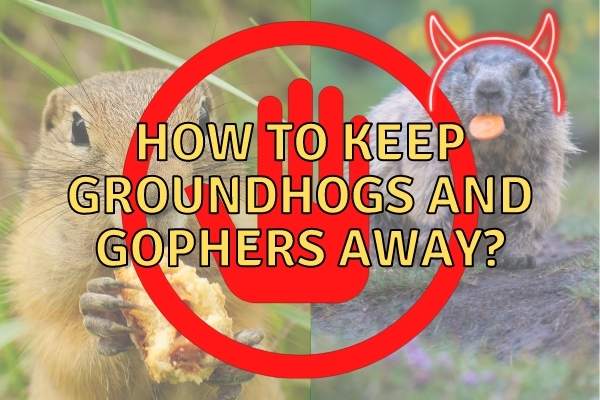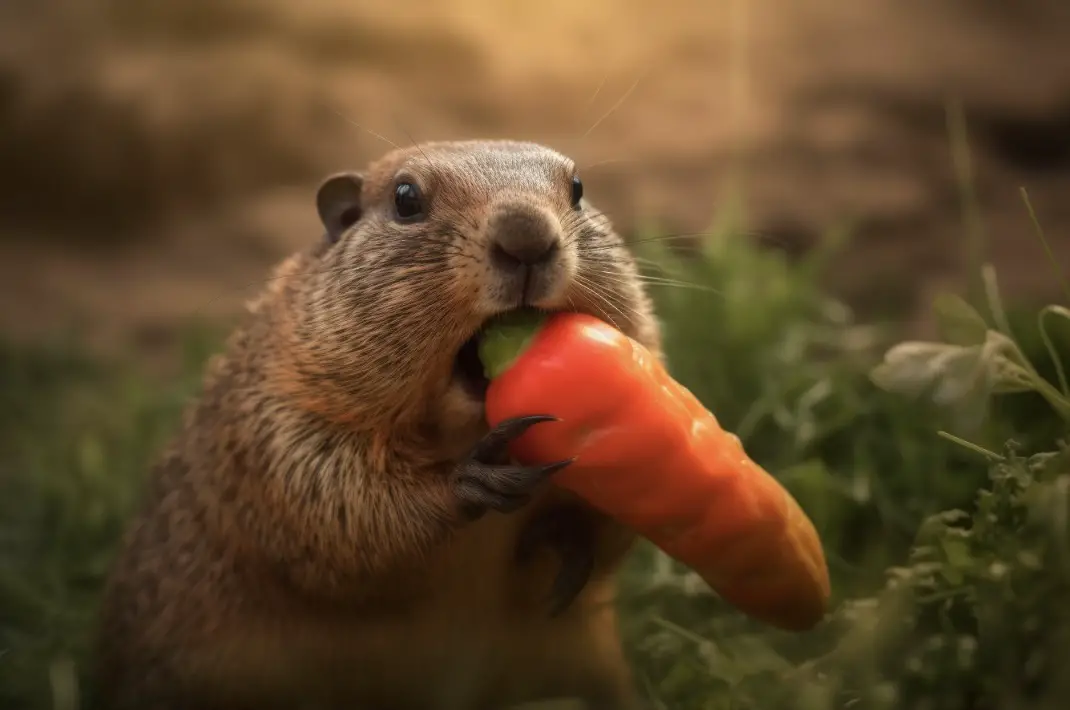As a biologist who has spent years studying and observing the behavior of groundhogs, I can confidently say that yes, groundhogs do eat bell peppers.
In this blog post, I will share my personal experiences and knowledge about groundhogs, their diet, and their love for bell peppers. I will also discuss how to protect your bell pepper plants from these critters and the impact of groundhogs on the ecosystem.
Groundhogs: A Brief Overview
Groundhogs, also known as woodchucks or whistle pigs, are rodents belonging to the family Sciuridae. They are native to North America and can be found in the eastern United States, Canada, and Alaska.
Groundhogs are known for their impressive burrowing skills, which they use to create extensive underground tunnel systems. These burrows serve as their home, providing shelter from predators and harsh weather conditions.
Groundhog Diet: What Do They Eat?
Groundhogs are primarily herbivores, meaning they primarily feed on plants. Their diet consists of various types of vegetation, including grasses, clover, alfalfa, dandelions, and other garden plants.

They also eat fruits, vegetables, and tree bark when available. Groundhogs consume a significant amount of food each day to maintain their energy levels, especially during the warmer months when they are most active.
The Groundhog’s Love for Bell Peppers
Bell peppers are a particular favorite of groundhogs, as they are attracted to their bright colors, sweet taste, and crunchy texture. In my personal observations, I have seen groundhogs munching on bell peppers many times, often leaving behind a decimated pepper patch in their wake. Groundhogs may eat both the fruit and the leaves of the plant, making them a significant threat to your vegetable garden.
Other Vegetables Groundhogs Enjoy
Bell peppers are not the only vegetables that groundhogs enjoy. They are also known to eat beans, peas, carrots, lettuce, and many other garden vegetables. Groundhogs are opportunistic feeders, meaning they will consume whatever is readily available and easy to access. This means that if your garden is unprotected, groundhogs are likely to help themselves to your produce.
The Impact of Groundhogs on Gardens
Groundhogs can cause significant damage to vegetable gardens, as they are known to eat a wide variety of plants. In addition to eating the produce, they may also damage plants by digging burrows nearby, causing the soil to become unstable and the plants to topple over. Groundhogs can be particularly problematic for gardeners who rely on their produce for sustenance or income.
Protecting Your Bell Pepper Plants
There are several methods you can employ to protect your bell pepper plants from groundhogs. One of the most effective methods is to install a sturdy fence around your garden, with the bottom buried at least 12 inches underground to prevent groundhogs from burrowing underneath. You can also try using repellents, such as hot pepper spray or predator urine, to deter groundhogs from entering your garden. Another option is to plant groundhog-resistant plants, such as onions, garlic, and chives, around the perimeter of your garden to discourage them from entering.
The Role of Groundhogs in the Ecosystem
Despite the damage they can cause to gardens, groundhogs play an important role in the ecosystem. Their burrowing activities help to aerate the soil, which can improve soil quality and promote the growth of vegetation. Additionally, groundhogs serve as a food source for various predators, such as foxes, coyotes, and birds of prey.
Groundhogs and Human Interaction
Groundhogs are generally shy creatures that prefer to avoid humans, but they can be bold when it comes to finding food. If you have a groundhog problem in your garden, it is important to address it in a humane and responsible manner.

Trapping and relocating groundhogs can be an effective solution, but it is essential to check your local laws and regulations before attempting this method. Additionally, it is important to remember that groundhogs, like all wild animals, can carry diseases, so it is crucial to take proper precautions to avoid contact with them.
Conclusion: Groundhogs and Bell Peppers
In conclusion, groundhogs do indeed eat bell peppers, along with many other vegetables commonly found in gardens. To protect your plants, consider implementing some of the strategies mentioned above, such as fencing and repellents. Keep in mind the important role groundhogs play in the ecosystem and treat them with respect and caution. Here are ten key facts about groundhogs and their relationship with bell peppers:
1. Groundhogs are herbivores that primarily feed on plants.
2. They are known to eat a variety of garden vegetables, including bell peppers.
3. Groundhogs are attracted to bell peppers due to their bright colors and sweet taste.
4. They can cause significant damage to gardens by eating plants and digging burrows.
5. Installing a fence around your garden is an effective method to protect your plants from groundhogs.
6. Repellents and groundhog-resistant plants can also help deter groundhogs from entering your garden.
7. Groundhogs play an important role in the ecosystem by aerating the soil and serving as a food source for predators.
8. Groundhogs are generally shy creatures that prefer to avoid humans.
9. If you have a groundhog problem in your garden, it is essential to address it in a humane and responsible manner.
10. Remember to take proper precautions to avoid contact with groundhogs, as they can carry diseases.
FAQs
What are groundhogs favorite foods?
Groundhogs are herbivores and their favorite foods include grasses, clovers, dandelions, and other wildflowers. They also enjoy fruits and vegetables such as apples, carrots, and lettuce.
What vegetables do groundhogs eat?
Groundhogs eat a variety of vegetables, including greens like lettuce, kale, and spinach, as well as root vegetables like carrots and sweet potatoes. They also enjoy fruits like apples and berries. However, they are known to have a particular fondness for garden favorites like beans, peas, and squash.
What is groundhogs worst enemy?
The groundhog’s worst enemy is the coyote.
What vegetables will groundhogs not eat?
Groundhogs are known to avoid plants with strong smells and tastes, such as garlic, onion, and chives. They also tend to avoid plants with prickly leaves, like squash, cucumber, and melons. However, it is important to note that groundhogs can be unpredictable and may still eat these vegetables if they are hungry enough.
How do I keep groundhogs out of my vegetable garden?
One effective way to keep groundhogs out of your vegetable garden is to install a fence that is at least 3-4 feet high and buried at least 1-2 feet deep to prevent them from burrowing underneath. Additionally, you can try using repellents or planting strong-smelling herbs and plants like garlic, onions, and marigolds around the perimeter of your garden to deter them.
What are groundhogs natural enemies?
Groundhogs have natural predators such as foxes, coyotes, bobcats, and birds of prey like hawks and eagles.





